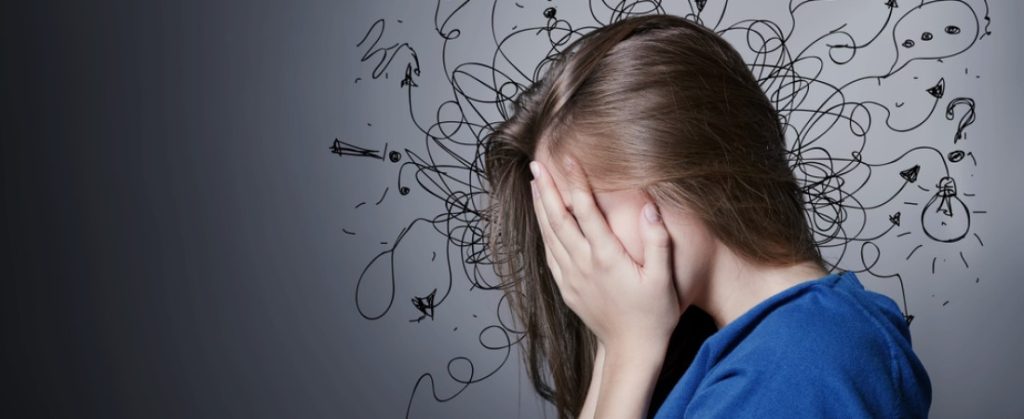UNDERSTANDING POSITIVE AND NEGATIVE ANXIETY
There are always some amount of Affective Symptoms of Anxiety when people are doing something new or any task with uncertainty for example appearing in an examination, attending a job interview, a risky stunt, or a sports competition, we may call it positive anxiety and it pushes the person to prepare well and do its best while living in the situation. On the other hand, there are people whose anxiety in daily routine disrupts their normal life due to an overwhelming amount of worries and fears while performing routine tasks and encountering various social situations, this is negative anxiety as it pulls the people back and we may consider such kind of people as suffering from anxiety disorder.
Affective Symptoms of Anxiety disorders are a group of mental health disorders that cause people of all ages to feel very frightened, fearful, and distressed in routine situations that would lack an anxiety response. If anxiety remains untreated, it may have extremely negative consequences not only in one’s personal life but also in one’s academic, professional, and social life. Gulf Addiction Treatment Center in Islamabad provides holistic treatment of all kinds of anxiety disorders.
COMMON ANXIETY DISORDERS
The most common types of anxiety disorders include:
Panic disorder
Panic disorder is mainly feelings of intense fear that strike without any apparent stimulus and occur persistently, without warning. People who suffer from panic disorder may have the feeling of suffocation, heart attack, and loss of emotional control. In order to avoid these panic attacks, people with panic disorder may begin to avoid going out into crowds or places in which they do not feel safe.
Post-traumatic stress disorder (PTSD)
PTSD is a disorder that develops when a person has experienced a traumatic incident for example natural disaster or sexual abuse – such kind of incident leads to flashbacks and emotional numbness.
Social anxiety disorder
Social anxiety disorder also known as social phobia is a mental health condition that involves extremely uncomfortable feelings in everyday social situations leading to avoidance of social gatherings. These may include fears of negative judgment by others and fear of ridicule. People with social phobia find it difficult to perform in academic and corporate situations.
Specific phobias
Specific phobia is a terrifying fear of a specific situation or object like height phobia or a fear of insects or animals like spiders or dogs. The level of fear is far stronger than that appropriate for the situation or objects and may lead to an avoidance of everyday, common situations.
Generalized anxiety disorder (GAD)
GAD involves unrealistic worries and tension without any logical reasoning. This unrealistic tension may last at least six months with poor concentration ability.
Drug-Induced Anxiety
Drug-induced anxiety develops due to drug addiction or drug abuse. As most of the drugs impact on brain’s reward system leading to chemical changes patients in withdrawal may face anxiety and depression. We are the best psychiatric hospital for anxiety disorders providing holistic treatment with the help of medication and counseling under the supervision of a drug rehab psychiatrist.
SIGNS AND SYMPTOMS OF ANXIETY
Affective symptoms of anxiety disorders will vary depending upon the specific disorder, any co-occurring mental health disorders, and frequency of symptoms. Below are common signs and symptoms of anxiety disorders
Behavioral symptoms
- Agitation and restlessness
- Inability to sit for long or remain calm
- Social isolation
- Inability to concentrate academically, at work, or at home
- Irrational irritability
- Impaired ability to function in daily routine life
- Drug addiction or self-medication
Physical symptoms
- Shortness of breath
- Fatigue and lazy
- Sleep disturbance or insomnia
- changes in patterns of eating or sleeping
- Excessive perspiration
- nausea, vomiting, and diarrhea
- Muscle spasms frequently
- Frequent headaches
- Nightmares
- Frequent changes in heartbeat
- Fine muscle tremors
- Cold or sweaty hands or feet
- Numbness or tingling in hands and/or feet
- Dry mouth
Cognitive symptoms
- Impaired concentration abilities
- Fear of negative consequences
- Mentally blank in most of the situation
- Fears without any stimulus
- Obsessed with uncontrollable thoughts
- The feeling of getting crazy
Psychosocial symptoms
- Feeling hopeless and helpless
- Feelings of panic and fear
- Mood swings
- Feeling useless
- Feeling in danger
- Flashbacks
- Feelings of social dissociation
Whatever the type of anxiety is, poses serious challenges in a person’s life, however fortunately they are treatable disorders. All above-mentioned anxiety disorders require anxiety medication and anxiety counseling and nobody needs to suffer because of these disorders. Whether the person is a child, teen, adult, or senior person can lead a productive and beautiful life.
UNDERSTANDING POSITIVE AND NEGATIVE ANXIETY Read More »

